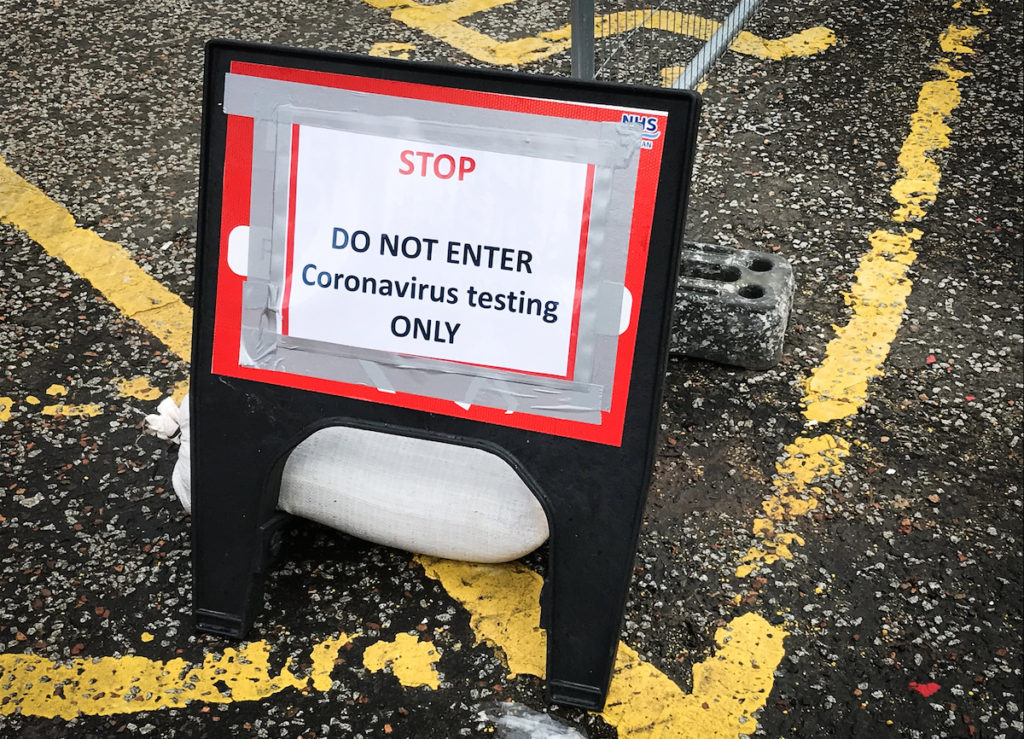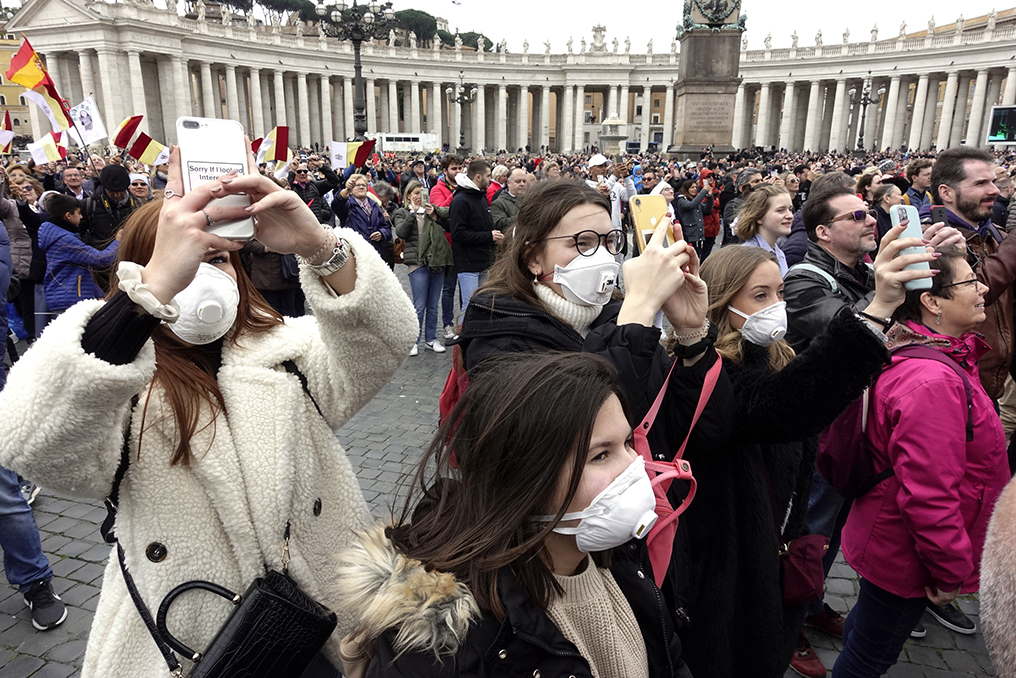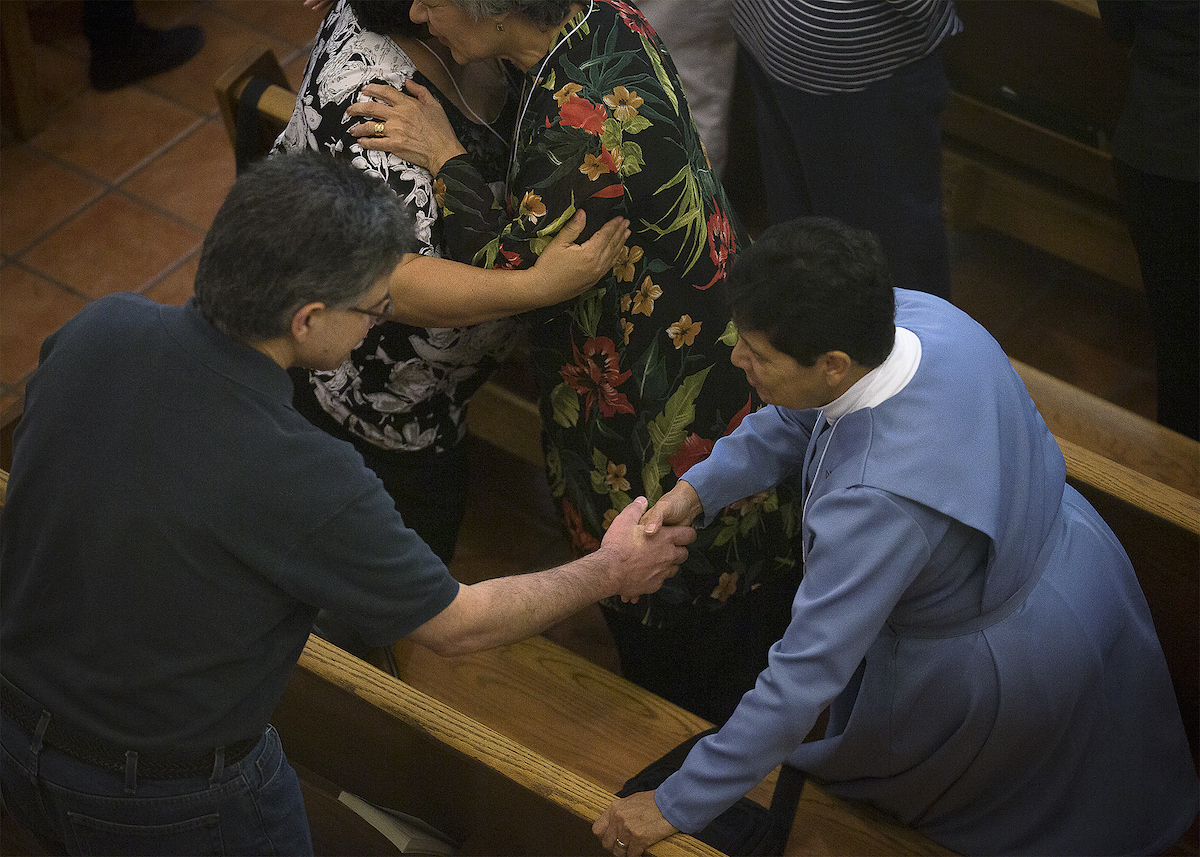
WASHINGTON — Dioceses nationwide, including the Diocese of Phoenix, are taking precautions to guard against the spread of the coronavirus and reminding parishioners to take commonsense steps related to hygiene in their personal lives.
Among the most common preventative measures being taken are urging reception of Holy Communion in the hand, suspension of distribution of the Precious Blood (when receiving the host, the communicant receives the Body and Blood, Soul and Divinity of Jesus Christ, and receiving the Precious Blood is not required) and exchanging the sign of peace without physical contact.
From Charlotte, North Carolina, to Honolulu, diocesan officials were implementing steps recommended by the U.S. Conference of Catholic Bishops’ Committee on Divine Worship to limit the potential spread of the illness that by March 4 had reached at least 75 countries including the United States; and health officials in the U.S. have confirmed more than 100 cases of the illness in 15 states, including at least 15 deaths.
Worldwide by March 3, more than 94,000 cases and more than 3,200 deaths have been attributed to the coronavirus, with most in China, the epicenter of the outbreak.
At this time the risk of contracting Coronavirus (COVID-19) in Arizona remains low — good hygiene and general flu precautions is what is being suggested for prevention by the Centers for Disease Control. The current status is one of heightened awareness and voluntary precautions — Level I, according to the liturgical guidelines of the U.S. Conference of Catholic Bishops.
“We gather as a community to celebrate the sacraments, it is important to be smart and think about what each of us can do to prevent the spread of respiratory viruses,” Diocese of Phoenix official said in a March 6 statement. “We live in a generation where information is at our fingertips; there are many sources of information that may not be accurate and may lead to increased fear. Let us remember that we are united in Christ through prayer and a common spirit of love and trust in Him.”
The diocese launched a website, dphx.org/stayhealthy, to provide guidance for parishes and parishioners throughout the Diocese of Phoenix and encouraged the faithful to check it regularly for updates.
In addition to the above-mentioned voluntary precautions, the Diocese of Phoenix has issued the following recommendations based on the Level I guidelines:
- The faithful are encouraged to stay home if they are sick. “Though it is true that it is a grave matter to miss Mass on Sundays and holy days, this never applies to those who are ill, especially those who are contagious or display flu-like symptoms,” diocesan officials said in the March 6 statement.
- Extraordinary ministers of Holy Communion should sanitize their hands before distributing the Eucharis
- The faithful should refrain from holding hands when reciting the Lord’s Prayer. According to some liturgical norms, this posture is already discouraged as it resembles the priestly “orans” posture.
- Masses other liturgies should be held in the main church rather than a daily Mass chapel.
- The faithful should refrain from using holy water fonts.

Regarding the reception of Holy Communion on the hand versus the tongue, diocesan officials affirmed that “individual communicants have the right to decide.”
Leaders from other dioceses also asked people who are ill to refrain from attending Mass. “If you are sick, stay home until you are feeling better,” Bishop David A. Zubik of Pittsburgh said in a March 2 announcement to parishioners.
At the same time, at least one bishop urged calm as people responded to the coronavirus, designated COVID-19 by world health authorities.
“Please encourage your communities during this time of uncertainty to prepare, but not panic,” Auxiliary Bishop Joel M. Konzen, administrator of the Archdiocese of Atlanta, said in a Feb. 28 memo. He said precautions preventing the spread of COVID-19 were similar to those to prevent the spread of flu.
In a Feb. 28 letter, Charlotte Bishop Peter J. Jugis urged clergy to remind parishioners to cover coughs and sneezes and throw away used tissues, clean all “high-touch” surfaces daily, avoid shaking hands, wash hands often and not share personal items such as cups and eating utensils.
Like diocesan officials across the U.S., Bishop Jugis encouraged priests not to extend the sign of peace, distribute Communion from the chalice or invite people to shake hands in greeting at Mass or other gatherings. Those who distribute holy Communion should wash their hands before Mass and clean their hands again before and after distributing Communion, he said.
Similar precautions were being implemented in the Washington, Baltimore, Chicago and Newark, New Jersey archdioceses and the Jackson, Mississippi, and Little Rock, Arkansas, dioceses and elsewhere. The Diocese of Fort Worth, Texas, reminded the faithful March 4 that precautions put in place Jan. 10 for the current flu season — such as suspending distribution of the Blood of Christ and handshakes during the sign of peace at Mass — remain in effect.
Beyond those steps, the Archdiocese of Miami also suggested that parishes empty the holy water fonts at church entrances, and it also is allowing extraordinary ministers of holy Communion who feel uncomfortable in carrying out their ministry to temporarily step down.

Among the many precautionary steps also being taken in the Baltimore Archdiocese, maintenance workers will step up efforts at parishes to disinfect areas that frequently come into contact with hands, such as tops of pews.
In similar letters to priests and deacons and to school administrators, Baltimore Archbishop William E. Lori also advised they follow general guidelines laid out by the federal Centers for Disease Control and Prevention and the Maryland Department of Health, including:
- Wash your hands frequently with an alcohol-based hand sanitizer or soap and water for at least 20 seconds
- Cover your mouth and nose while coughing or sneezing
- Avoid close contact with people who are sick
- If you are sick, stay home from work or school
- In general practice good health habits
Guidelines from the Ohio Department of Health for dealing with contagious illnesses were reviewed in a statement shared with parishes and posted on the Diocese of Cleveland’s website March 2.
That diocese’s Office for Worship also reminded priests, deacons and extraordinary ministers of holy Communion to continue practicing good hygiene including frequent hand washing.
At the U.S. Conference of Catholic Bishops, Msgr. J. Brian Bransfield, general secretary, March 3 requested in an email to staff that they “refrain, until further notice, from planning any new international travel.”
He called on workers who had already purchased tickets for travel to “reconsider the necessity of the trip in consultation with your senior staff supervisor and determine an appropriate plan of action.”
Meanwhile, the Diocese of Honolulu in mid-February declined to put in place any restrictions at Mass. However, Fr. Pascal Abaya, rector of the Cathedral Basilica of Our Lady of Peace in the Hawaiian capital told worshippers the Communion chalice would no longer be distributed, a step he called “precautionary” during flu season.
The practice continued during the first week of Lent, a diocesan official confirmed.
In New Haven, Connecticut, where the Knights of Columbus has its headquarters, spokesman Joseph Cullen said March 4: “We are keeping those who work for the Knights of Columbus up to date on resources and best practices to avoid infection and contagion.”
“Our local councils and individual Knights, he added, “are praying for the sick and those who have died and we stand ready to comply with any diocesan policies that are applicable to K of C programs. The same is true of civil efforts to prevent the spread of the virus.”
Contributing this story was Tim Swift, the social media coordinator for the Catholic Review and the Archdiocese of Baltimore.







